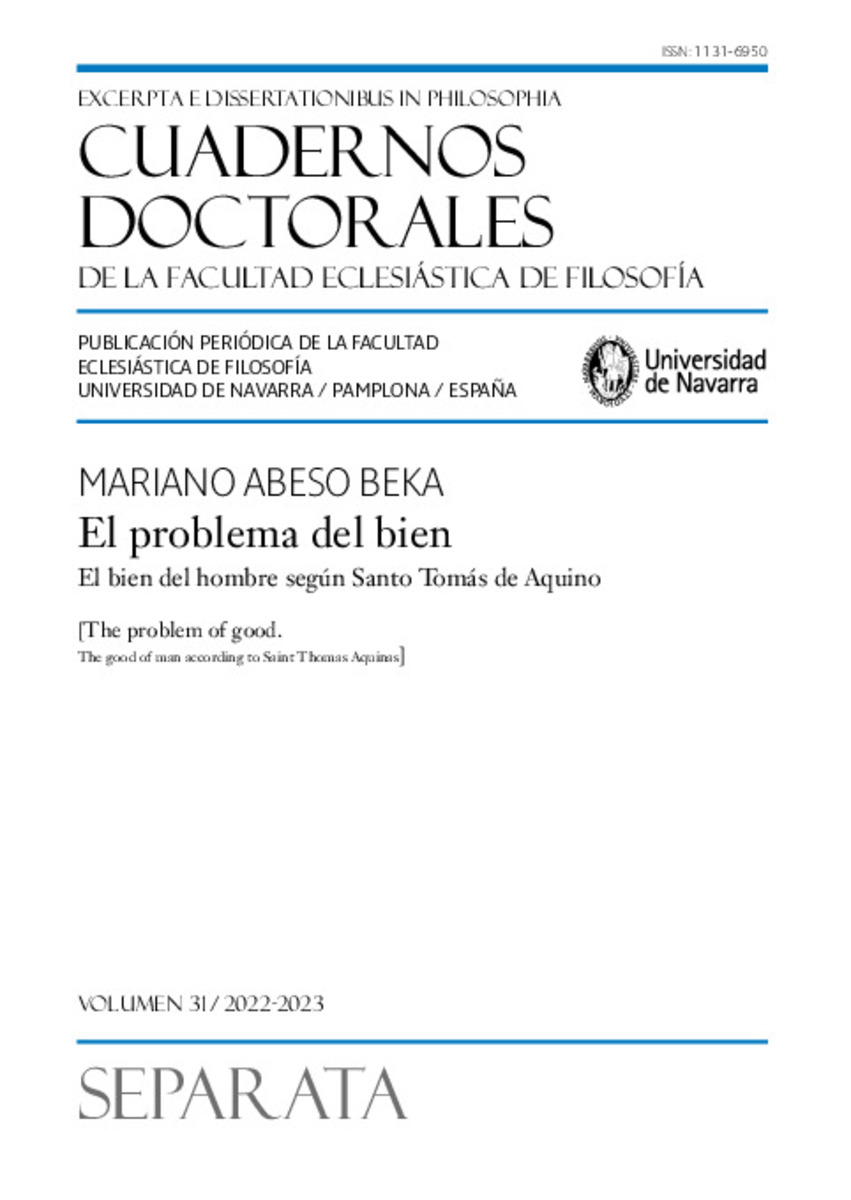Full metadata record
| DC Field | Value | Language |
|---|---|---|
| dc.creator | Abeso-Beka, M. (Mariano) | - |
| dc.date.accessioned | 2022-12-21T11:06:45Z | - |
| dc.date.available | 2022-12-21T11:06:45Z | - |
| dc.date.issued | 2022 | - |
| dc.identifier.citation | Abeso-Beka, M. (Mariano). "El problema del bien. El bien del hombre según Santo Tomás de Aquino". Cuadernos Doctorales de Filosofía. Excerpta e dissertationibus in Philosophia. 31, 2022, 5 - 133 | es |
| dc.identifier.issn | 1131-6950 | - |
| dc.identifier.uri | https://hdl.handle.net/10171/64937 | - |
| dc.description.abstract | Pretendemos mostrar que desde el pensamiento de Santo Tomás de Aquino la vida humana aparece como un continuo tender hacia la plenitud, hacia aquello que colma perfectamente el anhelo de bien de la voluntad humana. Y nuestro tender al bien no es perfecto sino perfectible. En este sentido, el primer principio de la razón práctica, al prescribir que hemos de hacer y perseguir el bien y evitar el mal, pareciera ser una suerte de principio tautológico, puesto que haciendo el bien estamos al mismo tiempo evitando el mal. Pero el problema del bien hace su aparición tan pronto como pasamos a concretar dicho principio general en las distintas situaciones, contextos, tiempos y culturas en que se desarrolla la acción humana. En efecto, nuestras facultades racionales están naturalmente indeterminadas, es decir, están abiertas a muchas cosas opuestas que requieren siempre de nuestra elección. Ahora bien, ¿cómo alcanzar un obrar estable, fácil, efectivo y deleitable? Es decir, ¿cómo realizar elección de acciones que acierten con el bien real? La respuesta está en la adquisición de hábitos virtuosos tanto de la inteligencia como de la voluntad. Pues sólo el conocimiento habitual permite al ser humano conocer de manera explícita la verdad y el bien, es decir, tener un conocimiento objetivo del bien que no sólo es lícito perseguir, sino también conveniente. Esto es así, porque toda acción que se realiza por amor al bien es la verdadera acción libre. Además, como seres humanos no nos basta el simple existir, sino que estamos hechos para vivir; pero tampoco nos es suficiente vivir de cualquier manera, sino vivir bien. Y esto último tiene como ingredientes necesarios la virtud y la ley, dos principios operativos que nos permiten no sólo actuar bien y ser buenos ciudadanos, sino también ser y enseñar a ser buenas personas. | es_ES |
| dc.description.abstract | We intend to show that from the thought of Saint Thomas Aquinas, human life appears as a continuous trend towards plenitude, towards that which perfectly fulfills the longing for good of the human will. And our tend to the good is not perfect but perfectible. In this sense, the first principle of practical reason, by prescribing that we must do and pursue good and avoid evil, seems to be a kind of tautological principle, since by doing good we are at the same time avoiding evil. But the problem of the good makes its appearance as soon as we go on to specify this general principle in the different situations, contexts, times and cultures in which human action takes place. Indeed, our rational faculties are naturally indeterminate, that is, they are open to many opposite things that always require our choice. Now, how to achieve a stable, easy, effective and delightful action? That is, how to make a choice of actions that hit with the real good? The answer lies in the acquisition of virtuous habits of both intelligence and will. For only habitual knowledge allows the human being to explicitly know the truth and the good, that is, to have an objective knowledge of the good that is not only lawful to pursue, but also convenient. This is so, because every action that is carried out for the love of the good is the true free action. Furthermore, as human beings it is not enough for us to simply exist, but we are made to live; but it is not enough for us to live in anyway, but to live well. And that has virtue and law as necessary ingredients, two operating principles that allow us not only to act well and be good citizens, but also to be and teach to be good people. | es_ES |
| dc.format.extent | 405 | es_ES |
| dc.language.iso | spa | es_ES |
| dc.publisher | Servicio de Publicaciones de la Universidad de Navarra | es_ES |
| dc.rights | info:eu-repo/semantics/openAccess | es_ES |
| dc.subject | bien | es_ES |
| dc.subject | virtud | es_ES |
| dc.subject | ley | es_ES |
| dc.subject | verdad | es_ES |
| dc.subject | elección | es_ES |
| dc.subject | razón práctica | es_ES |
| dc.subject | good | es_ES |
| dc.subject | virtue | es_ES |
| dc.subject | law | es_ES |
| dc.subject | truth | es_ES |
| dc.subject | choice | es_ES |
| dc.subject | practical reason | es_ES |
| dc.title | El problema del bien. El bien del hombre según Santo Tomás de Aquino | es_ES |
| dc.type | info:eu-repo/semantics/article | es_ES |
| dc.publisher.place | Pamplona | es_ES |
| dadun.citation.endingPage | 133 | es_ES |
| dadun.citation.publicationName | Cuadernos Doctorales de Filosofía. Excerpta e dissertationibus in Philosophia | es_ES |
| dadun.citation.startingPage | 5 | es_ES |
| dadun.citation.volume | 31 | es_ES |
Files in This Item:
Statistics and impact
Items in Dadun are protected by copyright, with all rights reserved, unless otherwise indicated.






